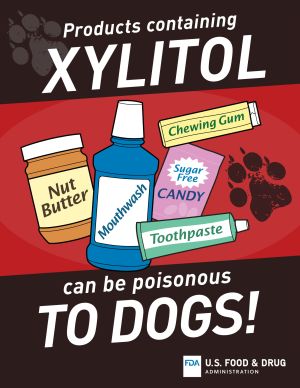Xylitol - Information for Dog Owners
What is xylitol?
Xylitol is a naturally occurring alcohol found in most plant materials. It is used as a sugar substitute in “sugar-free” chewing gums, mints, and other foods because it has fewer calories and a lower glycemic index than common table sugar (sucrose). It is also used as a medicine, a source of energy in tube feeding formulas for people, and in products that treat dry mouth and tooth decay.

What are some common sources of xylitol?
- Chewing gum
- Mints
- Candies
- Peanut butter
- Ice cream
- Chewable vitamins
- Cough syrup
- Mouthwash
- Toothpaste
- Anything labeled “sugar-free” or “skinny”
Why is xylitol toxic for dogs?
The hormone insulin moves sugar (glucose) molecules from the bloodstream into the body’s cells. In dogs, xylitol is quickly absorbed into the bloodstream and stimulates a potent release of insulin from the pancreas. This rapid release of insulin causes a dramatic drop in blood sugar levels as glucose is moved from the bloodstream into cells.
What are the symptoms of xylitol poisoning in dogs?
- Vomiting
- Weakness
- Incoordination
- Collapse
- Seizures
What is the treatment for xylitol poisoning in dogs?
If you suspect your dog has eaten a product containing xylitol, contact your primary care veterinarian or local veterinary emergency clinic immediately.
Treatment consists of preventing further xylitol absorption from the gut, if the dog ate a suspect product very recently, and managing the resultant low blood sugar and associated complications. Most dogs will be hospitalized to receive intra-venous fluids, dextrose, and liver protectants and to monitor their blood sugar levels and liver function.
What can I do to keep my dog safe from xylitol poisoning?
- Keep all products that contain xylitol out of reach from your dogs. This includes purses, bags, or clothing pockets containing gum or mints (yours or those of any guests) and anything on a table or countertop.
- Only use veterinary toothpaste to brush your dog’s teeth (never human toothpaste).
- Check the ingredient list for all nut butters or ‘human foods’ that you may share with your dog.
Summary:
- Xylitol is a sugar substitute used in many “sugar-free” or “skinny” human foods and products such as gum and peanut butter.
- Xylitol triggers a potent release of insulin in dogs which results in a dramatic drop in blood sugar. This low blood sugar level and its resulting complications can be life-threatening.
- Always keep xylitol-containing products out of reach from dogs.
- Check the ingredient list of all ‘human foods’ for xylitol before you share them with your dog.
- If you suspect your dog has eaten a product containing xylitol or is showing symptoms consistent with xylitol poisoning, contact your local veterinary emergency clinic and seek treatment immediately.
References and Resources:
FDA Consumer Update – Paws Off Xylitol: It’s Dangerous for Dogs at https://www.fda.gov/consumers/consumer-updates/paws-xylitol-its-dangerous-dogs
Help Future Generations of Dogs
Participate in canine health research by providing samples or by enrolling in a clinical trial. Samples are needed from healthy dogs and dogs affected by specific diseases.



